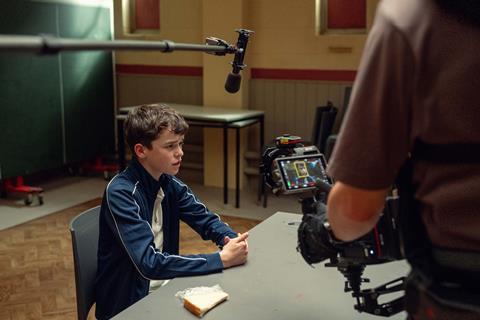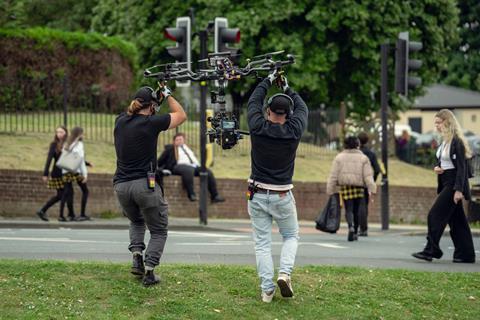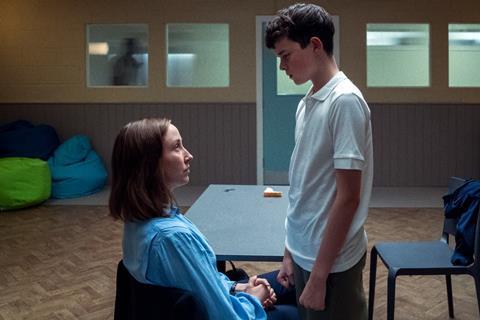This story of teen murder and the malicious world of online influencers has shocked parents and politicians alike. The Adolescence team of Philip Barantini, Stephen Graham, Jack Thorne and Jo Johnson talk about making “drama that matters”.

Since it debuted on Netflix in March, Adolescence has become the biggest talking point of the year. The four-part show about a 13-year-old boy accused of murdering his classmate is being discussed in homes, schools and even UK Parliament; not just for its technical mastery – each hour-long episode was shot as one take – but for the issues it raises about online safety.
It is also the result of years of creative partnership. Writers Jack Thorne and Stephen Graham (who also stars) have collaborated for decades, on shows including This Is England, The Virtues and Help. Graham worked with director Philip Barantini on his one-shot feature Boiling Point (2021), and producer Jo Johnson on series including The Walk-In and A Thousand Blows. Graham and Thorne also have a longstanding relationship with Warp Films (This Is England, The Virtues), which produces alongside Plan B, Graham’s Matriarch Productions and Barantini’s It’s All Made Up Productions.
On the eve of the show winning three Gothams, including for Graham and co-star Owen Cooper, Screen International sat down with Barantini, Thorne, Graham and Johnson to discuss the show’s production and impact.
Screen International: Adolescence has become one of the biggest hits of the year, but how did it first come together?
Stephen Graham: Plan B got in touch and asked Phil if he’d be interested in collaborating with me on a one-shot TV show. I thought a TV show about one fella for eight hours would be a bit boring. But then [this idea] hit me like a bolt of lightning. Phil and I love [UK crime doc series] 24 Hours In Police Custody, so we were immediately excited about what that first episode could be. We knew we wanted to grab the audience by the scruff of the neck. I knew Jack was going to write it, and I also knew we needed to bring Warp on board because they were the people that could help us get this off the ground.
Jack Thorne: Stephen said two things to me [about the project]. The first was that it was all going to be single takes, and that he wanted to work with Phil. The second was that he didn’t want it to be something that blamed the parents. So the question became, how do we build this complicated portrait of responsibility? We started talking about the education system, about friends, about parental responsibility. But I was still struggling to work my way through it and then Mariella [Johnson, Thorne’s scriptreader] said to me, “I think you should look at incel culture and the manosphere.” Jamie is not just a product of the manosphere, he wouldn’t ever describe himself as an incel. But when I started looking into it, that ideology was persuasive. Then Jamie broke open for me.
The manosphere, male violence – these are incendiary topics. Were you always sure you could tell this story in the correct way?
Jo Johnson: With Jack and Stephen as our writers, we knew the subject matter was going to be handled correctly. I never had a concern that it wasn’t going to be truthful.
Philip Barantini: When Stephen was first telling me this idea, it was so visual to me. The way we were told this story was always going to be one take. Then when Jack and Stephen were working on it together and I was sent things to read, it felt effortless between us. It always felt like it was such a collaborative process. Steve and I are from the north of England, and we wanted it to be a working-class story about normal people.
When did Netflix come on board?
Graham: Amazon [Prime Video] gave us the finances to write the first script but ultimately they made the decision that it wasn’t for them. We left that meeting feeling like we just played the FA Cup final and lost four-nil. But we immediately decided to go to Netflix. And they loved it.
Thorne: We had this window to work with Phil and Steve, and we were always aiming for that. The thing about the process we were in [with Prime Video] was that it was always about one script. But because we were aiming for this window, we pushed ahead and wrote episodes two and three while we were stuck in the limbo of their decision-making. When we took it to Netflix, we had three of the four scripts ready to show them and they were able to see the scope of it. They greenlit us in the room during our first meeting.
There is obviously no input at edit stage on a project like this, but did Netflix have any involvement in production?

Barantini: The Netflix execs would come down to set on the Tuesday or Wednesday of tech week [the second week of the three weeks it took to rehearse and film each episode] to make notes. By that point, we’d rehearsed it for a week already with the actors, so we were in a good spot about how the episode was flowing.
At the end of episode two, we attach a camera to a drone and it flies over the murder site. We were on the Tuesday of shoot week, by which point we’d shot the episode four times, when Mark [Herbert, executive producer] pulled me aside and told me that Toby [Bentley, Netflix executive producer] thought we needed more of Stephen in the episode, so could we land that drone in the car park and have Eddie there laying down some flowers?
I mentioned it to Matt Lewis, our DP, and we decided to try it. Because of the weather, by Friday we still hadn’t got it. During that final take, those of us watching the monitors lost the connection completely as soon as the drone took off. So we had no idea whether it had worked for about 20 minutes. Then Matt came back and showed us the footage, and it was like we had won the World Cup.
How often did you use the last take for an episode?
Barantini: Episode one, we used the second take because there was something raw about it. But every other episode, we used the last take. Something magic happened on them – people felt more relaxed, the energy was palpable.
How did you make sure the technical craft never overwhelmed the narrative?
Johnson: The point of making it is to tell a great story with impact. I’ve had so many people say to me, “I watched the show and I had no idea it was one shot.” We weren’t trying to be clever. The intention was that we pull the viewer in and know that the viewer won’t look away.
Thorne: It changed all our vocabulary, and was a challenge to all of us. As a writer, it forced me to be partial, to be incomplete, to be all the things I’m not normally. The moment when it caught fire for me was in our first week of rehearsal. We shot episode three first, and I was watching Matt and Phil negotiate where the camera should look during a conversation. It wasn’t going to be the traditional way of ‘eye line, eye line, two shot’. And the people it gives power to is the actors, because they are in control of the story all the way through.
During rehearsals, were there things you had written that just didn’t work for the format?
Thorne: Absolutely. But any decision about changing the script came from genuine collaboration rather than a panic, which is what often happens on sets.
Graham: For that first week [of rehearsal], it’s just us actors and Phil and Jack. I’m not an intellectual actor, I’m an instinctive actor. But within this process, we got to talk about why we were saying the things we were saying. Jack’s writing can sometimes feel like it’s improvised because it’s so real. Then you spend the whole week with Phil and Jack and you talk it through, and then it becomes yours.
That collaborative approach must have been very helpful for Owen Cooper, in his first role as Jamie. How did you find working with a newcomer?

Barantini: The process started months before, with all of us talking about whether we could cast a real 13-year-old to play this role. We were asking a lot, not just physically but mentally and emotionally. We looked at 16, 17, 18 year-olds who looked younger. But there’s something that happens between the ages of 13 and 15, your body changes and you become a young man. And we wanted Jamie to look like a boy.
Owen was one of the frontrunners early on. We were a little nervous, as we shot episode three first, which is just two people in a room – one of them being Owen. On the first day of rehearsals, Owen came with no script, and he was like, “I’ve learned it.” In that moment, I knew he was going to be okay.
Thorne: That first week of rehearsals, it was like a magic trick. Owen was brilliant when he first arrived, but he wasn’t Jamie. Through that first week, through Phil and Erin [Doherty, who plays Jamie’s therapist Briony Ariston] gently nudging him into position, he became Jamie.
Barantini: There was a [challenging] moment on the first or second day. Owen is the loveliest kid, so I had to push him quite hard to get him to be aggressive with Erin. There was a moment where he went there so much that he actually couldn’t get back out of it, and he was getting very emotional. Owen, like Steve, is not acting, he’s reacting. That’s what acting is. It’s being present in the moment and speaking the truth. Owen instinctively does that. He doesn’t come into the room with any preconceptions about what it is to be an actor.
The youngsters were well safeguarded on set, but did that support also extend to their families?
Johnson: My job was to make sure the families of all of the youngsters, particularly Owen, were completely comfortable with what their kids were being asked to do. They had me as a port of call to discuss any concerns they may have had. If you can keep the families informed and comfortable and enjoying the experience as much as the young actors, it’s an excellent balance.
Graham Jo created a beautiful atmosphere on set for all our young cast. We were filming over the summer, so they would all be playing cards and football. And every now and again, Owen would let someone else play with his Swingball!
Barantini: Before each take, Stephen would give these mega speeches to all of the youngsters. He would fire up the troops, essentially.
After all this hard work, do you feel like you achieved what you set out to do?
Graham: And a hell of a lot more.
Barantini: We definitely set out to make something that sparked a conversation. I had no idea that conversation would spread as far as it’s gone.
Thorne: I grew up watching EastEnders with my mum on the sofa, and talking to her about what we’d seen. We wanted to create a sofa show. We’ve had some amazing people say nice things about the show, but the best comments are from friends who have said things like, “I’ve had a conversation with my 14-year-old I’ve never had before.”
Did you expect it to become an education and political tool, to potentially spark real change?
Graham: Never. We set out to make something with love, care and respect for the subject. We made it, we raised this child so to speak, and then we let it go off into the ether. It’s up to other people to see it as they will. All art is subjective. That’s what we do, we make art. And in this situation, we did make some art.
Thorne: We’re not so grand! I’ve certainly been trying to make this sort of stuff for years. I made this show Help with Stephen during the pandemic, that I hoped would lead to loads of questions being asked about disability, about our care services. And what happened was everyone went, “That was a really good show,” and then nothing changed. I think Adolescence feels very vivid. The internet scares a lot of people, and I think the fact we are asking questions about young violent men, and what created that violence, has got people talking.
Barantini: I’ve got an eight-year-old daughter, I had no idea of some of the stuff that goes on. We all know the internet has some positives, but it’s also got a lot of negatives. And we have shone a light on that.
Was there ever any trepidation about putting your heads above the parapet about these issues?
Johnson: I’ve always wanted to make drama that mattered, that can make a difference, that people talk about. And you do have to put your head a little bit above the safety line to achieve that. It’s very easy to make drama that’s interesting, fun and is forgotten. But this won’t be, and that’s why I’m very proud of it. This is drama that matters, and this is why I needed to be involved in it the very day I read the script for the first time.
Are there any plans for a second season, given this is a conversation that needs to continue?
Thorne: We’ve told Jamie Miller’s story, and we don’t want to tell any more of his story. There might be a further iteration of us trying to work on the one-shot format and telling a story in a different way. We’re talking about it, but I can tell you exclusively, we haven’t got the answer to that yet.
Barantini: I would 100% do it again. I’ve done [one-shot] prior to Adolescence with Boiling Point, and the one thing that was constantly in my head is that I didn’t want this to be a gimmick. The one-shot format does not lend itself to everything. Jack and I are talking about it.
Graham: If it goes ahead, I can’t wait.















![[L-R]: Amanda Villavieja, Laia Casanovas, Yasmina Praderas](https://d1nslcd7m2225b.cloudfront.net/Pictures/274x183/6/4/1/1471641_pxl_20251224_103354743_618426_crop.jpg)









No comments yet